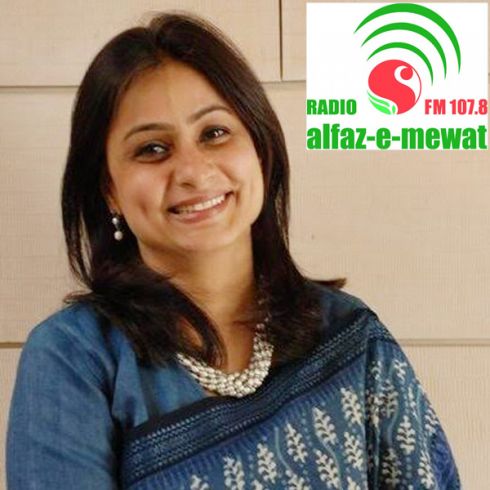
MUMBAI: Talks about changing the societies thought process towards women is constant, but hardly practiced. But, before one heads there the women themselves need to know more about their rights and ways of living, especially in rural areas. Alfaz-e-Mewat, a CRS in a small village of Mewat has been working in this direction.
The village where the radio station is located is at one and a half hour’s drive from Gurugram, a technology hub, but unfortunately, Mewat is way too far from technology. It is still stuck in the 18th century, thus, the women there are unaware of their rights.
When the station team was doing research on a series of programs on ill effects of open defecation on women's health, women would mention the discomfort faced during their menstrual days, and some of them also said that at times they even sit on a wooden plank to control the motion in their menstrual days.
Alfaz–e-Mewat is in the interiors of Mewat, a village called Ghagas. The radio station operates on a low powered transmitter, targeting the community within 10-15 kms.
“Before launching the radio station, we first observed the area and learnt about the communities reservations. If we go back to their history, they have their reasons for the way they are,” said Sehgal Foundation communications director Pooja Murada.
The team found major difficulties in changing the society. “We understand that meeting the groups and one-to-one conversations were reaping results but these were not on a massive scale. I tried other mediums of information like wall-paintings and community newspaper. This added advantage to the large information divide that existed but due to very low literacy level in the area, we needed something more. Major problems were due to lack of information and that’s how radio was born here,” added Pooja.
The government was pumping in money for the community but it wasn’t reaching the needy. “So, we wanted to reach out to the less literate people, especially women in the society and the ones who were missing out on the information,” explained the director.
She further added, “We started giving radio sets to women through different activities. This helped us reach them easily.”
The strategy worked well and today the radio station has many women radio callers along with listeners. “At the onset, the station did not have any women callers. After several discussions and programmes with the women, from no women callers in 2012, we had about 880 women callers, out of 16,000 callers in 2016. We are striving to get more and more women participation at the station by engaging them in our programs,” said Pooja.
Some villagers came forward and spoke about their life-changing experience.
“I have got a lot of information on agriculture through Alfaz-e-Mewat’s program, Tohfa-e-Kudrat: Jal, Jangal, Zameen (gifts of nature: water, forests, and land). My husband is handicap and I take care of the farm with my son and daughter-in-law. The information was really helpful and we got an increased produce,” said Rehmati from Sehri village, Nuh.
One of the ninth grade students said, “It was for the first time that youth got a platform to share their concerns and problems. Alfaz-e-Mewat gave us voice without disclosing our identities. We have gained so much from our association with the radio station. The radio series gave us a lot of strength to talk about our problems at home and be confident in expressing ourselves.” The radio station reaches out to all age groups.
Not just this, the station also helped saving an old man’s radio repairing business. As there were more of radio sets being used now, whenever a radio set was to be fixed, they visited his shop.
Talking about the content on the show, they have worked on issues like adolescents’ emotional health, financial literacy, and mental health, besides informative programs on water, agriculture, health, education, and entertainment programs.
The radio station had to work hard in proving that they will be successful in their objective. “This area is very challenging not only for us but also the government. There is progress in the community and the government is supporting us. The initial stage was challenging as we had to prove that there will be enough listeners and this will establish as a link between the common man and the authority,” concluded Pooja.
Alfaz-e-Mewat has achieved some success in the past few years, but the station aims to further strengthen community voices through the medium.